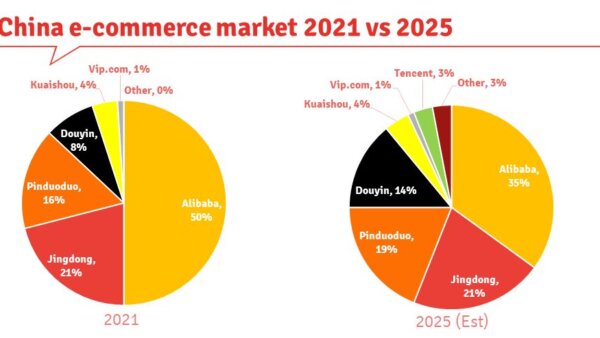TEMU & Co. erwischen den Handel in Europa in einem Moment der Schwäche. Nachdem die amerikanischen Plattformen in ihren Nischen zu quasi Monopolen erwachsen sind, könnte das nun auch mit chinesischen Plattformen passieren. Das Plattform „Game“ ist bitter und für Europäer wahrscheinlich nicht gewinnbar. Können wir es dann ggf. aufhalten oder so regeln, dass wir auch wirtschaftlich von den Plazttformen profitieren? Das besprechen Florian und ich im aktuellen monthly Heinemann.
In diesem Video diskutieren wir die Notwendigkeit von Regulierungen in der Plattformökonomie, insbesondere in Europa. Wir erwähnen die Herausforderungen, die durch internationale Plattformen entstehen, insbesondere aus China, und die Notwendigkeit, mit ihnen zu konkurrieren. Ich stimme der Perspektive zu, dass Regulierungen erforderlich sind, um gleiche Wettbewerbsbedingungen zu schaffen und Probleme wie Steuerunterschiede und unfairer Wettbewerb anzugehen. Wir schauen auf die Bemühungen der EU, Regelungen wie das Digital Markets Act und das Digital Services Act einzuführen.
Links im Podcast:
Kleine Anfrage zum Weltpostvertrag: https://dserver.bundestag.de/btd/19/167/1916789.pdf
OMR Rabbit Hole https://omr.com/de/daily/omr-rabbit-hole-die-samwer-story/
11 Leben: https://podcasts.apple.com/de/podcast/11-leben-die-welt-von-uli-hoene%C3%9F/id1529264775
Die folgenden Zusammenfassung wurde automatisch über summarize.tech erstellt.
- 00:00:00 In this section, the host talks about the need for regulation of platforms in Europe. He mentions that international platforms, especially from China, have a significant presence in the market and the challenge is to compete with them. He refers to a previous discussion with Timo and Shein about the topic and mentions that they have not reached a clear conclusion yet. The host suggests looking at how other countries view this issue and considers the perspective of Scott Galloway. He also mentions the World Postal Agreement and the need for clearer rules to protect against the dominance of large platforms. The host believes that Europe needs to solve this problem collectively rather than on a country-by-country basis, and he plans to continue discussing it in future episodes. Additionally, he invites experts to join the discussion on logistics and the costs associated with shipping packages from China to Germany. The host also recommends two podcast series, OMR’s „Samwer Stories“ and Max Jakob Ost’s „Elf Leben,“ for further listening. The episode ends with a thank you to Julian for his research assistance.
- 00:05:00 In this section of the video, the speaker discusses their involvement in a nonprofit initiative called Startup Teams, which aims to foster entrepreneurship among students. They mention a recent business plan competition where teams had the chance to win €10,000. The speaker is impressed by the number of alumni from previous competitions who have gone on to become entrepreneurs. They also note that there is a growing trend of more students starting their own businesses instead of pursuing traditional career paths. The speaker suggests that this initiative provides valuable opportunities for students to gain entrepreneurial skills, as entrepreneurship is not widely taught in schools. They acknowledge that there may be a concentration of participants from certain schools, but believe that parents and supportive teachers can help expand the program. The speaker also reflects on the fact that they may be too „old“ to fully understand current digital platforms and trends, especially compared to the younger generation who have grown up with them. They mention Zalando as an example of a successful online platform, but suggest that new companies with different approaches may be surpassing traditional ones.
- 00:10:00 In this section, the speaker discusses the need for regulation in the digital platform economy. They mention that new platforms such as Temo and Schienenerinnen face unfair competition as they lack the resources and advantages that established platforms like About You and Co. have, such as exemptions from value-added tax and subsidies from the Chinese government. The speaker believes that there should be a level playing field and comparable conditions for all market participants. They argue that regulation should not stifle innovation but ensure that market players adhere to certain standards and are held accountable. The speaker acknowledges that relying solely on consumer behavior is unrealistic and highlights the importance of regulation to address these issues. They also mention that regulatory tools designed to prevent monopolies have limited effectiveness in the global platform economy, making the situation more complex. The speaker acknowledges that as entrepreneurs, they may sometimes argue against regulation, similar to how traditional retailers opposed online retailers in the past.
- 00:15:00 In this section, the speaker discusses the argument made by Scott Galloway that the efforts to regulate platforms in the EU are necessary because Europe only experiences the disadvantages of large platforms, such as job loss and difficulty for smaller businesses to thrive, without reaping the benefits that the US enjoys, such as increased employment opportunities and wealth creation. The speaker agrees with Galloway’s perspective, stating that any regulation that creates a level playing field should be viewed positively. They also highlight the US’s own regulatory deficit, where companies like Apple and Google are able to bypass the American tax system, resulting in less tax revenue for the country compared to what could have been generated through a healthier small and medium-sized business sector.
- 00:20:00 In this section, the speaker discusses the need for regulation in the platform economy. They mention that there have been previous cases where powerful platforms or companies have monopolized the market, and regulation was necessary to ensure fair competition. While the speaker believes in the efficiency of markets, they argue that leaving the market to self-regulate is not effective when there is no level playing field. They highlight the efforts of the EU in introducing regulations like the Digital Markets Act (DMA) and the Digital Services Act (DSA) to address this issue. They also mention the difficulty the US legal system faces in regulating platforms due to the voluntary nature of customers‘ use. However, in Europe, there is a different perspective where they recognize the need for regulation to protect the ecosystem and address tax disparities.
- 00:25:00 In this section of the video, the speaker discusses the need for regulation in platforms such as Amazon, Apple, and Google. They highlight the issue of these companies paying minimal taxes in Europe, suggesting that a portion of their revenue should stay within the region. The speaker argues that while innovation is important, it is also crucial to ensure that some of the value generated by these platforms remains in Europe. They believe that excessive profit accumulation and decreased innovation are some of the negative consequences of allowing monopolistic market positions to persist. The speaker suggests that a balance between innovation and regulation needs to be struck, similar to the pharmaceutical industry’s patent system, which allows for a limited period of exclusivity before generic competitors can enter the market. They emphasize the importance of regulatory authorities having a deep understanding of the industry and the ability to assess the level of innovation before implementing stricter measures.
- 00:30:00 In this section, the discussion revolves around the need for regulation in the digital economy and technology companies. The speaker mentions that the fast pace of innovation in these industries poses challenges for regulation. However, he also highlights the importance of creating a level playing field and addressing potential dangers posed by artificial intelligence (AI). The speaker suggests that regulators should consider restricting certain areas where only government or state actors can be involved, particularly in fields related to military strength. He emphasizes the need for the EU to actively engage in regulating AI, while also ensuring that only certain players, closely associated with respective military forces, have the authority to operate in these areas.
- 00:35:00 In this section, the speaker discusses the need for regulation in economic activity based on platforms. They suggest that it is important to gather enough data and learning points before implementing regulations, as rushing into regulatory measures may lead to economic disadvantages. The speaker emphasizes the importance of building a solid foundation of experience and understanding before implementing regulations, as well as the need to assess the practical implications of such regulations. They argue that it is more efficient to allow economic activity to flourish initially and then regulate it in a targeted manner, rather than imposing stringent regulations from the start. The speaker also mentions the potential risks of other countries or economic regions being less cautious or proactive in their regulatory approach.
- 00:40:00 In this section, the speaker discusses the lack of information and transparency regarding the World Postal Agreement and its impact on the costs of shipping Chinese packages to the EU. The speaker highlights the complexity of the regulations and the existence of both national and international agreements that affect shipping costs. It is noted that the current situation allows for Chinese packages to be shipped at significantly lower costs, which goes against the goal of a level playing field. The speaker also highlights the conflicting interests and suggests that some European package senders may benefit from the current situation. The lack of information and clarity from the government is criticized, as evident in the unanswered questions about cost coverage and international returns. The speaker concludes by expressing disagreement with the current state of affairs, where products can be purchased from Timo for significantly lower prices than on Amazon.
- 00:45:00 In this section, the speaker discusses the need for greater regulation of platforms like Amazon. They explain that while some EU regulations have attempted to address this issue, there is still a lack of consensus and effective enforcement. The speaker argues that the complexity of the issue, combined with the knowledge advantage of Chinese companies and the self-interest of the US, makes it difficult for regulators to keep up. They suggest that more awareness and action from political decision-makers and consumer organizations is needed to address the challenges posed by these platforms. The speaker also mentions the importance of having accurate information and the possibility of involving experts to better understand and address the issue.
- 00:50:00 In this section, the discussion revolves around the Digital Services Act and the Digital Markets Act proposed by the EU. The focus is on regulating social media platforms, marketplaces like Amazon, and holding platform operators accountable for harmful content. The regulation aims to ensure that platforms have the responsibility to remove false or inappropriate content. However, concerns are raised about the effectiveness of the regulation and the tools available for enforcement. Additionally, the Digital Markets Act addresses issues such as fair competition and preventing platforms from favoring their own products over others. The concept of interoperation is also highlighted as an important aspect.
- 00:55:00 In this section, the speaker discusses the possibility of implementing open interfaces in messaging platforms, similar to how mobile networks allow cross-network calling. They also mention the idea of introducing regulations that require platforms to have a certain percentage of products or apps from local or European sources, which could lead to higher prices but also prioritize national interests. The speaker also talks about the concept of a European data market, where data from outside the EU would not be easily accessible, potentially creating a separate digital space. While the implementation and impact of these regulations are still uncertain, the speaker believes that they could provide a level of regulatory control and economic autonomy within the EU. However, they express concerns about potential limitations on certain platforms or technologies, like Google Maps, and the reliance on European alternatives.
Dieser Podcast wird unterstützt von Husqvarna Forst & Garten.
Seit 1689 am Markt, fertigt Husqvarna hochwertige Garten- &
Forstprodukte und steht für bahnbrechende Innovationen wie den
weltweit ersten kommerziellen Mähroboter, den Automower®. Mehr unter husqvarna..






